Ending the Scourge of Sexual Violence in Conflict; Highlights from WILPF-Nepal and MENA--PeaceWomen E-News, June 2013
If you have any difficulty reading this newsletter in HTML, please view it online.
Why does the scourge of sexual violence in conflict continue, and how can we eliminate it? In preparation for the June 24th Security Council (SC) Open Debate on Sexual Violence in Conflict, UN Member States focused their attention on this issue, and PeaceWomen has been there to push for an integrated approach to take steps forward.
With an increasing focus on sexual violence in recent years (this is the fourth resolution on this subject), PeaceWomen's priorities on this issue have been to ensure a broad and inclusive perspective. In individual and collaborative advocacy and events, PeaceWomen highlighted the message that sexual violence in conflict is a failure to implement all elements of the full Women, Peace and Security (WPS) agenda, and that addressing the root causes – not just applying Band-Aid solutions – requires strengthening women's full and equal participation and rights, preventing violence, ensuring accountability, and providing strong resourcing on these issues. 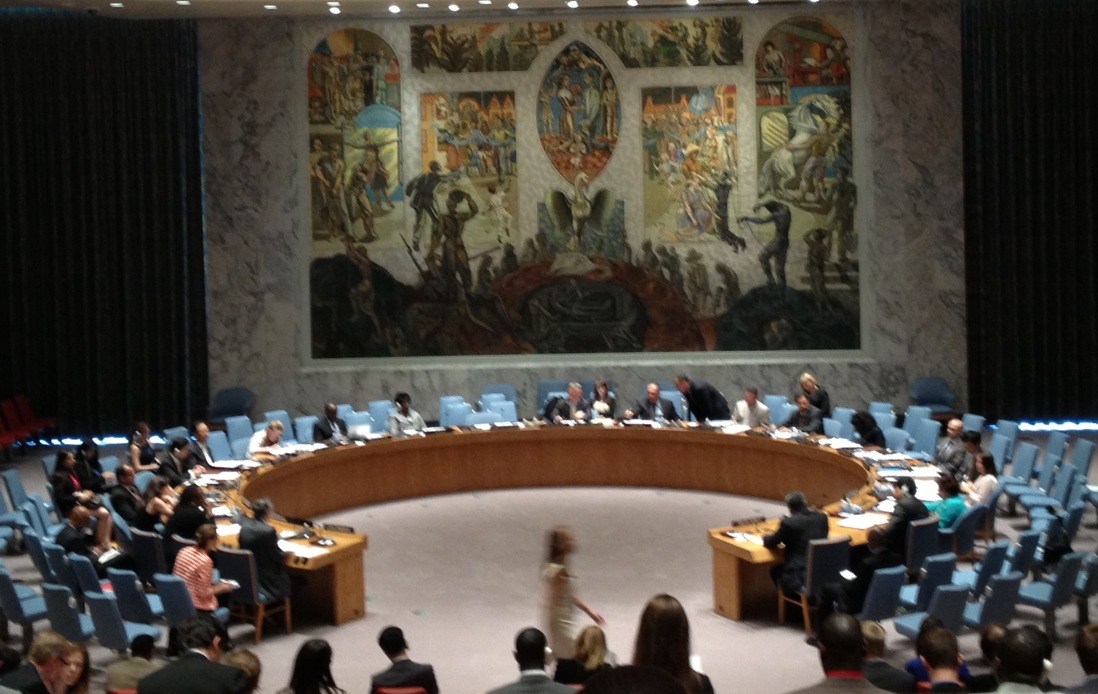
In the lead up to the debate, we engaged in targeted advocacy, brought attention to key issues, and continued our independent and comprehensive monitoring of all WPS issues at the Security Council and 1325 National Action Plans. Highlighting the importance of a comprehensive rather than narrow approach, PeaceWomen held our seventh WPS lecture with Acting Head of UNWomen Ms. Lakshmi Puri on “Justice, Security, and Women's Leadership – UN Women's Priorities in Combatting Violence against Women in Conflict” (see featured article below). Connecting issues of women, peace and security to those of development, we contributed to a feminist coalition response to a Post2015 High Level Panel report; this highlighted the importance of sustainable development processes that prioritize people over profit and women's equal human rights and human security over militarization and perpetual growth. Breaking down silos between UN human rights and WPS processes, we worked with the WILPF Human Rights programme to propose ways of strengthening the CEDAW General Recommendation on women in conflict prevention, conflict, and post conflict. Finally, responding to key areas of crisis, we supported the WILPF MENA project in a joint-letter calling for increased Syrian women's inclusion in peace processes.
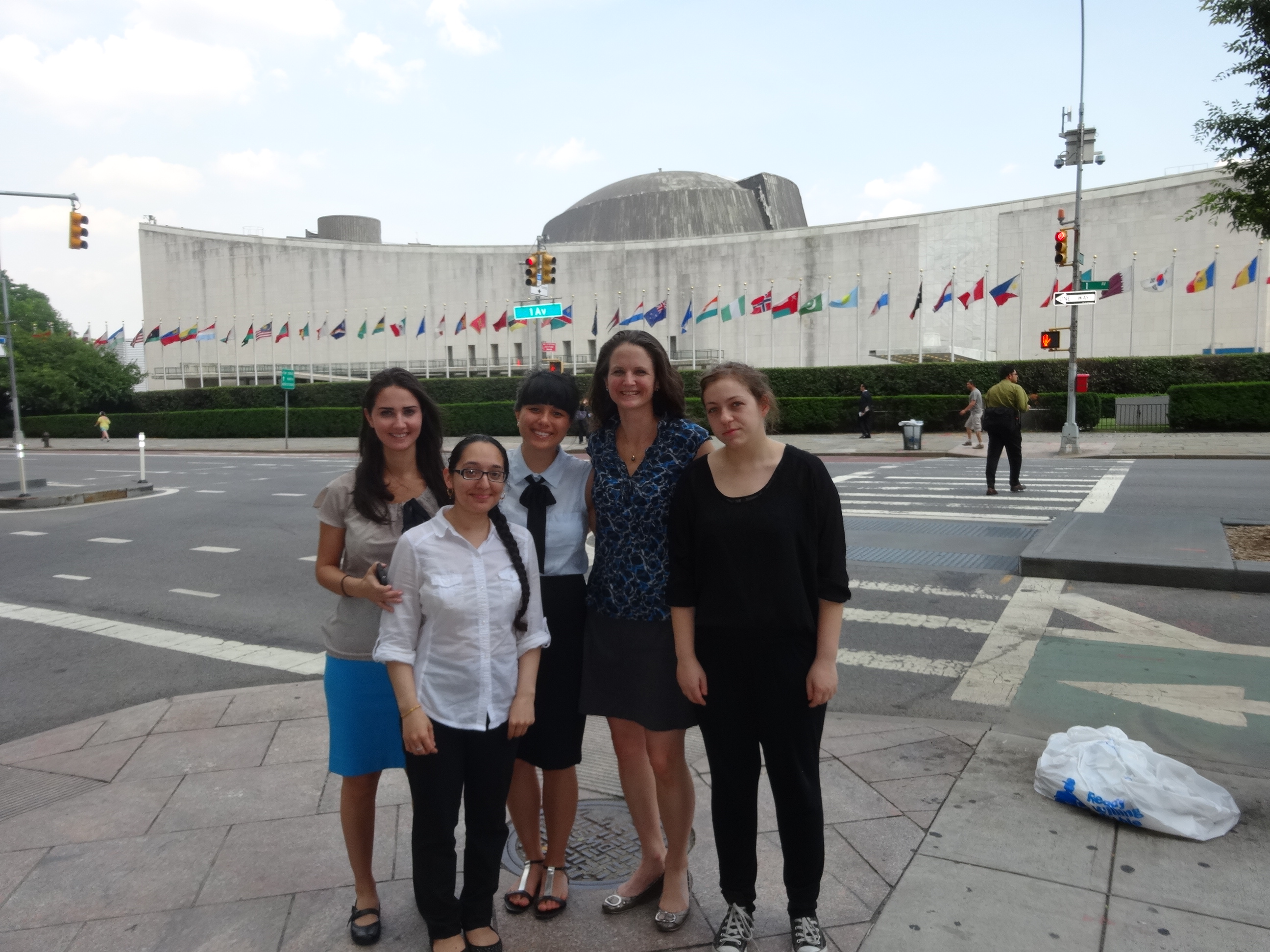
There is much work to be done in the coming months. We will be working with WILPF sections and local partners on National Action Plans (NAPs) and preparing for the November NAP Global Review, expanding our iPhone app, continuing our WPS lecture series (next one: July 9th on Men, Peace and Security!), working with Reaching Critical Will to promote ratification and implementation of the Arms Trade Treaty, and continuing to push for strong and holistic WPS action on the Security Council that addresses but goes beyond sexual violence to address root causes of violence and war.
During this time, we would also like to invite WILPF section members to contribute updates about your work on women, peace and security. We thank WILPF-Nepal for providing a section update for this edition. We look forward to continuing to work with you as we move forward together.
In this edition, we feature news and initiatives on the significant participation of women in the India-Pakistan peace process and recent Turkey protests. We also include Lakshmi Puri's remarks on women's role in sustainable growth, development, peace, and security in Africa. Additionally, we feature a report on the challenges in investigating sexual violence in South Sudan, and highlight the UN Security Council debate on preventing sexual violence in conflict.
Women and PeaceBuilding in the Great Lakes Region
On June 4th, 2013, the Permanent Mission of Ireland organized and hosted a High Level Panel discussion on Women and Peacebuilding in the Great Lakes region, with the participation of Special Envoy for the Great Lakes Region of Africa, Mary Robinson; Special Representative of the Secretary General (SRSG) on Sexual Violence in Conflict Zainab Bangura; Development Minister of Ireland Joe Costello and women's civil society leader and Ugandan lawyer and peacebuilder Lina Zedriga.
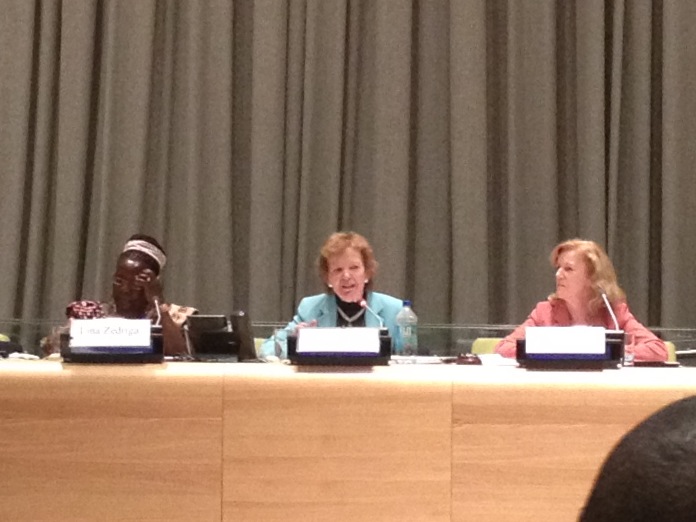
Robinson focused on asking for support from member states and civil society to ensure the pressure and action needed to implement the February 24th Peace, Security and Cooperation Framework. Robinson referred to the framework as a “Framework of Hope” highlighting the importance of civil society input and collaboration with the UN's efforts to prevent and end violence against women in the region and most particularly in DRC.
WILPF-Nepal Celebrates WILPF's 98th Anniversary by Building Local Women's Capacity to Promote Peace and Freedom
To celebrate WILPF's 98th anniversary this year, WILPF-Nepal conducted a capacity-building workshop on June 15th on women's human rights advocacy. Applying the WILPF integrated approach on peace and security to issues of concern for WILPF-Nepal, the section organized a workshop that included women's political leaders, rights activists, journalists, and local WILPF members.
In this program, section participants shared and celebrated WILPF's founding ideas of peace and freedom. 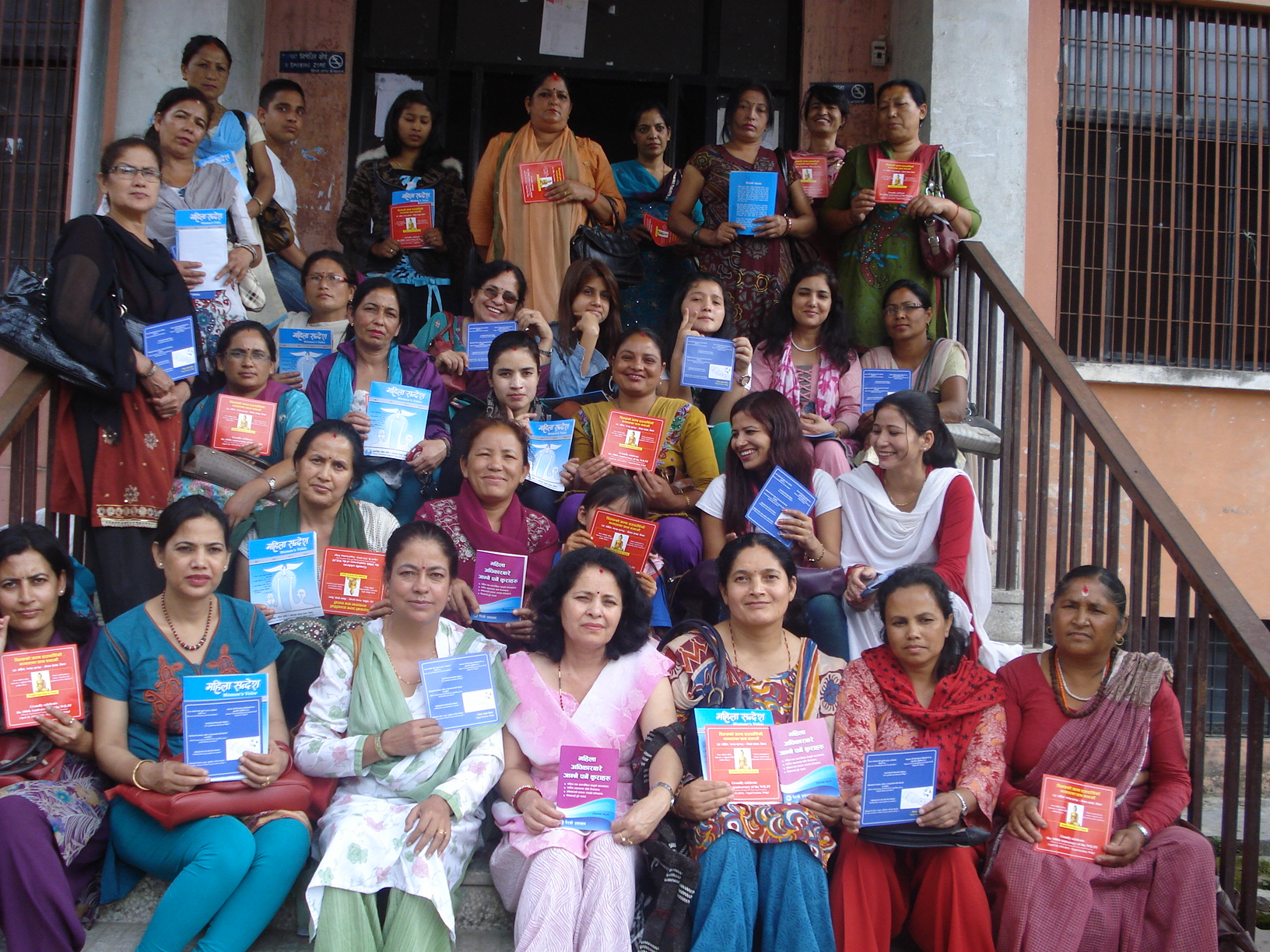 WILPF-Nepal also published and distributed their section magazine, Women's Voice, along with other reading materials that encouraged participants to learn more about national and international women's rights and explore causes of war and ways to build peace. In doing so, they clearly illustrated WILPF's unique ability to connect global policy advocacy with local action on women's human rights, disarmament, and the women, peace and security agenda. With a high tea included as part of the celebration, participants left refreshed and motivated to take action to strengthen women's human rights and promote security for all.
WILPF-Nepal also published and distributed their section magazine, Women's Voice, along with other reading materials that encouraged participants to learn more about national and international women's rights and explore causes of war and ways to build peace. In doing so, they clearly illustrated WILPF's unique ability to connect global policy advocacy with local action on women's human rights, disarmament, and the women, peace and security agenda. With a high tea included as part of the celebration, participants left refreshed and motivated to take action to strengthen women's human rights and promote security for all.
Learn more about WILPF-Nepal and their work here.
To contribute your own stories about local WILPF section work on women, peace and security, contact our E-News Sub-Editor Isma Aslam here.
WPS Lecture Series: Justice, Security, and Women's Leadership: UN Women's Priorities in Combatting Violence against Women in Conflict
On June 7th, PeaceWomen held the seventh event in our Women, Peace and Security (WPS) lecture series with the Permanent Mission of Liechtenstein and the Lichtenstein Center for Self-Determination at Princeton University. Speaking in the UN's Trusteeship Council Chamber, Acting He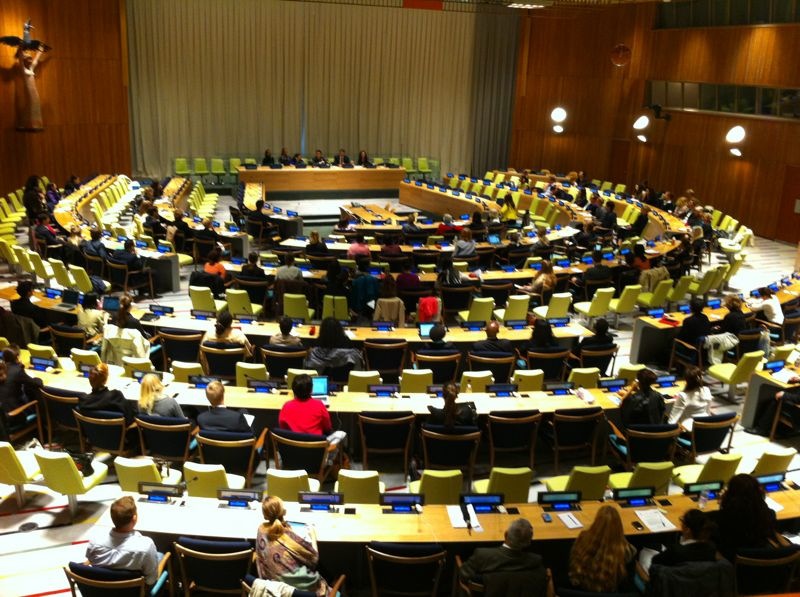 ad of UN Women and UN Assistant Secretary-General, Lakshmi Puri, spoke on “Justice, Security and Women's Leadership- UN Women's Priorities in Combatting Violence against Women in Conflict.”
ad of UN Women and UN Assistant Secretary-General, Lakshmi Puri, spoke on “Justice, Security and Women's Leadership- UN Women's Priorities in Combatting Violence against Women in Conflict.”
In support of the WILPF Integrated Approach to peace and security and in recognition of the continued need for a long-term view, Ms. Puri argued that efforts to protect women from sexual and gender based violence are inseparable from efforts to empower them and strengthen their leadership capacities. In other words, building security for women cannot succeed without achieving gender equality. Although the issue of conflict-related sexual violence (SVC) has had increasing attention by the Security Council in recent years, and a fourth resolution on SVC was adopted on June 24th, sexual and gender-based violence arises from deeply rooted inequalities between women and men. Consequently, a holistic approach to dealing with SVC that addresses the root causes of violence and includes all four pillars of the WPS agenda – prevention, participation, protection, and relief and recovery – is critical to implementing all WPS resolutions.
Read more about our Women, Peace, Security lecture series here.
Women in Conflict: a Close Look at Syria
What are the gendered consequences of the war in Syria? Are the UN Security Council Resolution 1325 and the international human rights framework having any impact in shaping the response to the on-going crises? How can it be ensured that women play their proper role in bringing peaceful resolution to the crises and contribute to building a society, which respects women's rights and gender equality? These and more questions were raised at the June 11 WILPF MENA side event on Syria, during the Human Rights Council in Geneva.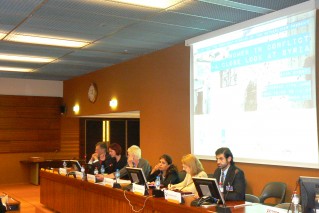
In front of a large audience of Member States and Civil Society organisations, four panelists from Syria, Lebanon and Jordan presented conditions and challenges for Syrian women inside Syria and in the neighbouring refugee settings and urged the international community to support women's and Civil Society groups to participate in bringing an end to the conflict.
Read the full WILPF MENA blog on the Syria HRC Side event here.
Read WILPF's joint-letter supporting inclusion of Syrian women in the mediation of the conflict.
Women and Peace and Security: Prevention of Sexual Violence
On June 24th, the UN Security Council held a day-long debate on Sexual Violence in Conflict. The Secretary-General Ban Ki-moon and the Special Representative on Sexual Violence in Conflict Zainab Bangura briefed. Jane Anywar, a Ugandan lawyer representing the Women's Initiatives for Gender Justice, spoke on behalf of civil society. Actress and ac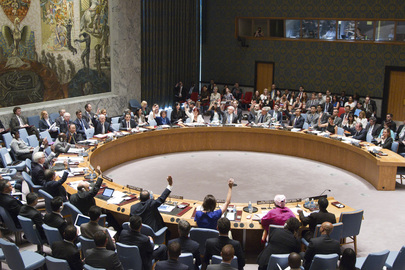 tivist Angelina Jolie spoke in her capacity as the Special Envoy of the UN High Commissioner for Refugees (UNHCR). The meeting was presided by the UK Foreign Secretary William Hague.
tivist Angelina Jolie spoke in her capacity as the Special Envoy of the UN High Commissioner for Refugees (UNHCR). The meeting was presided by the UK Foreign Secretary William Hague.
The meeting resulted in unanimous adoption of a resolution on Sexual Violence in Conflict (S/RES/2106) under the Women, Peace and Security agenda. The debate featured over 50 statements, including the statements made on behalf of the European Union and the African Union. Overall, the speakers focused on justice and the necessity to hold perpetrators accountable for their action. The frequently mentioned fragile states were Syria, Mali, and the DRC.
For our summary and analysis of the debate and UN SCR 2106, click here.
